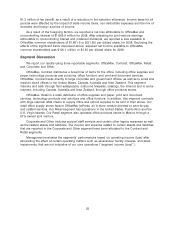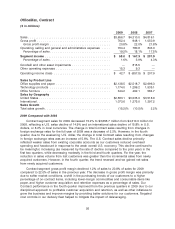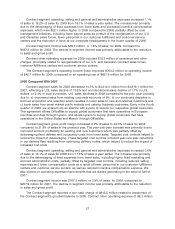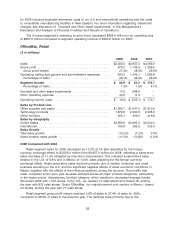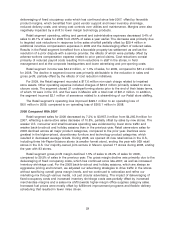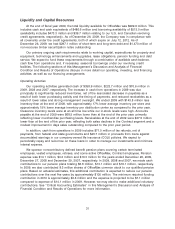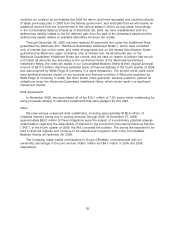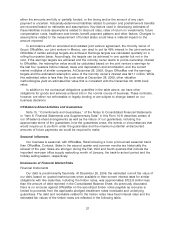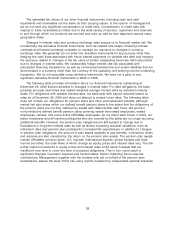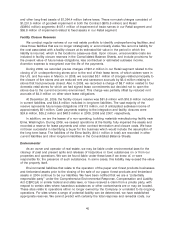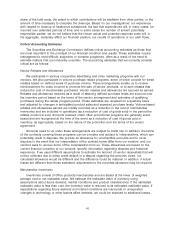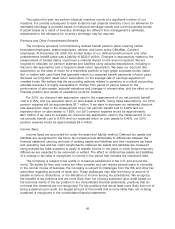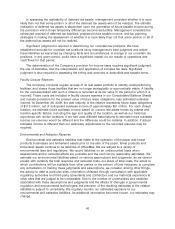OfficeMax 2009 Annual Report Download - page 37
Download and view the complete annual report
Please find page 37 of the 2009 OfficeMax annual report below. You can navigate through the pages in the report by either clicking on the pages listed below, or by using the keyword search tool below to find specific information within the annual report.during 2009 or 2008. Letters of credit, which may be issued under the U.S. Credit Agreement up to
a maximum of $250 million, reduce available borrowing capacity. Stand-by letters of credit issued
under the U.S. Credit Agreement totaled $61.1 million at the end of fiscal year 2009 and
$66.7 million at the end of fiscal year 2008. At the end of fiscal year 2009, the maximum aggregate
borrowing amount available under the U.S. Credit Agreement was $534.4 million and availability
under the U.S. Credit Agreement totaled $473.3 million. The U.S. Credit Agreement allows the
payment of dividends, subject to availability restrictions and if no default has occurred. At the end
of fiscal year 2009, we were in compliance with all covenants under the U.S. Credit Agreement. The
U.S. Credit Agreement expires on July 12, 2012.
Borrowings under the U.S. Credit Agreement bear interest at rates based on either the prime
rate or LIBOR. Margins are applied to the applicable borrowing rates and letter of credit fees under
the U.S. Credit Agreement depending on the level of average availability. Fees on letters of credit
issued under the U.S. Credit Agreement were charged at a weighted average rate of 0.875% during
2009. We are charged an unused line fee at an annual rate of 0.25% on the amount by which the
maximum available credit exceeds the average daily outstanding borrowings and letters of credit.
On September 30, 2009, Grand & Toy Limited, the Company’s wholly owned subsidiary based
in Canada, entered into a revolving credit agreement (the ‘‘Canadian Credit Agreement’’) with a
group of banks. The Canadian Credit Agreement permits Grand & Toy Limited to borrow up to a
maximum of C$60 million subject to a borrowing base calculation that limits availability to a
percentage of eligible accounts receivable plus a percentage of the value of eligible inventory less
certain reserves. The Canadian Credit Agreement may be increased (up to a maximum of
C$80 million) at Grand & Toy Limited’s request or reduced from time to time, in each case
according to the terms detailed in the Canadian Credit Agreement. There were no borrowings
outstanding under the facility at the end of fiscal year 2009, and there were no borrowings
outstanding under this facility during 2009. Letters of credit, which may be issued under the
Canadian Credit Agreement up to a maximum of C$10 million, reduce available borrowing capacity.
There were no letters of credit outstanding under the Canadian Credit Agreement at the end of
fiscal year 2009. The maximum aggregate borrowing amount available under the Canadian Credit
Agreement was $39.7 million (C$41.6 million) at the end of fiscal year 2009. Grand & Toy Limited
was in compliance with all covenants under the Canadian Credit Agreement at the end of fiscal
year 2009. The Canadian Credit Agreement expires on July 12, 2012.
Timber Notes/Non-recourse debt
In October 2004, we sold our timberland assets in exchange for $15 million in cash plus credit-
enhanced timber installment notes in the amount of $1,635 million (the ‘‘Installment Notes’’). The
Installment Notes were issued by single-member limited liability companies formed by affiliates of
Boise Cascade, L.L.C (the ‘‘Note Issuers’’). In order to support the Installment Notes, the Note
Issuers transferred $1,635 million in cash to Lehman and Wachovia Corporation (‘‘Wachovia’’)
($817.5 million to each of Lehman and Wachovia) who issued collateral notes to the Note Issuers
and guarantees on the performance of the Installment Notes. In December 2004, we completed a
securitization transaction in which the Company’s interests in the Installment Notes and related
guarantees were transferred to wholly-owned bankruptcy remote subsidiaries. The subsidiaries
pledged the Installment Notes and related guarantees and issued securitized notes (the
‘‘Securitization Notes’’) in the amount of $1,470 million. Recourse on the Securitization Notes is
limited to the proceeds from the applicable pledged Installment Notes and underlying Lehman or
Wachovia guaranty. As a result, there is no recourse against OfficeMax, and the Securitization
Notes have been reported as non-recourse debt in our Consolidated Balance Sheets.
On September 15, 2008, Lehman filed for bankruptcy. Lehman’s bankruptcy filing constituted
an event of default under the $817.5 million Installment Note guaranteed by Lehman (the ‘‘Lehman
33




